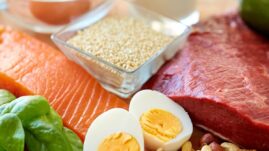Do you ever feel like the food you eat is working against you?
For more than a decade, I was dealing with severe bloating and constipation. It got so bad it was significantly impacting my health and happiness.
I had seen an incredible number of doctors and gastroenterologists. I had also been put through a lot of tests and prescribed all sorts of medication without any of it truly helping. It wasn’t until I finally found the root cause of my problems that my symptoms largely disappeared.
I tell you: it’s a brand new, happier, and more comfortable world for me

Bloating, constipation, and diabetes: my experience
Constipation is typically defined as:
- Having fewer than three bowel movements a week
- Stool that is dry, hard, or otherwise difficult to pass
- Discomfort or bloating along with bowel movements
After all the specialists I had seen, it ended up being my husband who found the right diagnosis for my bloating and constipation via a Google search of my symptoms.
Usually, I really don’t recommend this approach — it’s crucial to rely on professional medical advice — but it proved pivotal in my case after feeling let down by my experiences with the healthcare system. We immediately followed up with my doctor to confirm the diagnosis and discuss treatment options.
(Disclaimer: It is strongly recommended to consult with healthcare professionals for diagnosis and treatment. While my experience was an exception, self-diagnosing via internet searches can lead to inaccuracies and potential health risks.)
In people with diabetes, bloating, constipation, nausea, and other digestive issues can often be caused by a complication known as gastroparesis, a condition in which damage to the nerve that controls the stomach muscles can slow stomach emptying.
Gastroparesis is usually found in people who have had high blood sugar levels for a long time. This condition can happen in both type 1 and type 2 diabetes, but it shows up differently in each.
In type 1 diabetes, high blood sugar over time can damage the nerves that control the stomach, causing gastroparesis. In type 2 diabetes, it’s also linked to how well blood sugar is managed, but factors like being overweight and having high blood pressure can play a role too.
Additionally, certain medications used for treating diabetes, such as metformin and alpha-glucosidase inhibitors (rare), can be linked to gastrointestinal side effects such as constipation.
And then, of course, there’s the possibility that there may be a cause or condition unrelated to your diabetes that is resulting in the bloating and other digestive difficulties, such as dehydration, low fiber consumption, a sudden increase in fiber intake (particularly if you are not drinking enough water), or a gastrointestinal issue like gastroesophageal reflux disease (GERD).
In my case, it turned out I have a FODMAP intolerance, which is a sensitivity to certain carbohydrates found in many foods. Common symptoms of FODMAP intolerance include:
- Cramping
- Diarrhea
- Constipation
- Stomach bloating
- Gas and flatulence
If you suspect a FODMAP intolerance, it’s important to seek professional diagnosis and guidance. A healthcare provider can confirm the intolerance through appropriate tests and help manage the condition with dietary adjustments, possibly including advice on medication and balanced fluid and fiber intake.
By doing a 6-week elimination of specific foods and a 4-week reintroduction, I was able to identify the items my body disagrees with and reduce or eliminate them from my diet.
Now, nearly all of my digestive issues have been resolved, though some minor symptoms might occasionally occur. This significant improvement has helped me understand the importance of closely monitoring and adjusting my diet, under the guidance of health professionals.
What are FODMAPs?
FODMAP stands for fermentable oligosaccharides, disaccharides, monosaccharides, and polyols.
In simpler terms, FODMAPs are certain types of short-chain carbohydrates (sugars) found in some foods. The issue for people intolerant to FODMAPs is that these sugars can’t be absorbed in the small intestine.
Instead, they are fermented (broken down) by bacteria living in the colon, creating gas and bloating. For some people, this can cause symptoms such as constipation or diarrhea.
The tricky part about understanding this is that not all sugars are FODMAPs, and it’s not intuitive which ones are. I ended up buying the Monash University FODMAP Diet App so I could look up foods on the go.
Also, to make things even more complicated, it’s possible to have an intolerance to some but not all FODMAP foods.
Some of the worst offenders for me are onions, garlic, and mushrooms. Although those are generally healthy foods, my body simply can’t deal with them.
There is no cure for FODMAP intolerance, so the only solution is to simply cut the offending foods out of your diet or consume very limited amounts.
Common sources of FODMAPs
According to the Monash University FODMAP Diet App, some common sources of FODMAPs include:
- Foods with more fructose than glucose (e.g., apples, cherries, peaches, pears, and many other fruits; honey; high-fructose corn syrup)
- Lactose (milk and milk products)
- Sugar polyols (sweeteners containing sorbitol, mannitol, xylitol, maltitol, and some fruits and veggies)
- Fructans (a type of carbohydrate found in wheat, rye, onions, and garlic)
- Galacto-oligosaccharides (prebiotics, a type of dietary fiber that feed the beneficial bacteria in the gut, found in legumes such as beans and lentils)
For me, cutting the biggest offenders out of my diet has made a world of difference to my gut health and overall happiness.
It’s important to note that while my specific trigger foods may not align with everyone’s, common culprits often include high-FODMAP foods like onions, garlic, beans, and certain fruits and wheat products. These foods are known to cause digestive issues for many people.
In my case, identifying and eliminating my personal trigger foods alleviated symptoms such as bloating, constipation, and excessive gas, which are common but not the only potential reactions one might experience.
Each person’s reaction can vary, and consulting a healthcare provider to tailor dietary adjustments is crucial for effective management.
How to diagnose a FODMAP intolerance
The best way to diagnose a FODMAP intolerance is to simply cut all high-FODMAP foods out of your diet for a while and see what happens to your digestion.
This diet is quite restrictive and isn’t intended to be maintained long-term, but it can help you pinpoint what foods may be negatively affecting you.
If you see a significant improvement during the elimination phase, there is a good chance you are intolerant to at least some FODMAP foods.
However, not everyone will experience clear results, and if you don’t see an improvement, it doesn’t necessarily mean FODMAPs aren’t a problem for you. In such cases, discontinuing the diet may be premature.
It’s important to conduct this dietary experiment under the guidance of a healthcare professional, such as a GI specialist or a dietitian with expertise in low-FODMAP diets.
They can help interpret your results and decide on the next steps, which might include further testing or adjustments to your diet. Consulting with a specialist ensures that you are making informed decisions about your health based on a comprehensive understanding of your symptoms and potential food triggers.
Also, it’s worth noting that if you have a condition such as small intestinal bacterial overgrowth (SIBO), you may feel worse on the elimination phase before you feel better as the overgrown bacteria die off.
After about 2 to 6 weeks of elimination, you can start systematically adding potential problem foods back into your diet one by one over the course of about 6 to 8 weeks. Add a single food (such as onions) for 3 to 4 days and see how your digestion reacts. If everything is still OK, then you can probably tolerate that food.
In between testing foods, you’ll revert back to the strict diet to avoid overlapping effects from multiple foods.
It is generally recommended that you conduct an elimination diet in collaboration with a registered dietitian nutritionist (RDN) to ensure that you get all the nutrients you need.
If they are also a certified diabetes care & education specialist (CDCES), they can also help ensure your blood sugar stays within target range as you’re adjusting your diet.
And even if you are familiar with the steps of an elimination diet, it’s always a good idea to check with a healthcare professional before you start. There may be other potential avenues you can explore before trying the diet, and they can help you plan a proper menu if you do move forward with an elimination diet.
Just be aware that FODMAP foods are cumulative. This means that you may be OK with small amounts of some FODMAP foods but have problems if you eat several of them together or in larger amounts.
It definitely takes a while to figure out what you can and cannot tolerate, but I can tell you from my experience that it’s so worth it.
Constipation and diabetes: from challenge to change
FODMAP intolerance is not unique to people living with diabete, and there is no established physiological link directly connecting the two conditions. But given that diabetes and IBS (irritable bowel syndrome) often go together, I think FODMAPs are worth paying special attention to if you have diabetes.
I lived with severe FODMAP intolerance symptoms for more than 10 years without any of the specialists I saw ever suggesting a food intolerance. That blows my mind!
And know that FODMAPs aren’t “alternative” science in any way. They are very well researched — Stanford’s Digestive Health Center even has specialists on the low-FODMAP diet and how to identify triggers.
As with everything in life, I believe knowledge empowers us. Knowing how we react to certain foods can enable us to make the right choices to have a happy and healthy life. Constipation and diabetes don’t have to go hand-in-hand!






Pat
I have suffered with constipation since high school… about 3 years after being dx with T1D. I too have been through multiple tests and multiple docs with no help. I found your article very interesting. I recently started on Ningxia Red and have had some help with that, but will try FODMAP if I start having issues again.
Christel Oerum
I hope you find the right remedy for you. Stomach issues are the worst
Gloria
My grandma has a serious bloating and gas and a constipation.She is diabetic and hypertensive patient.is there any home remedy that can help her to solve this problem? i am not aware of giving her medicines because she is on other many medicines for diabetes and hypertension.
Christel Oerum
There are some different “over the counter” products that can help with gas and constipation. However, given her condition, I’d suggest that you discuss any supplementation with her medical team first. I was successful in solving the issues, not because I added anything, but because I eliminated the foods that were giving me issues
Rob Bagwell
My severe stomach bloating started when I was put on Lantus and all of my many years of gym time tanked. Now I have constant discomfort, fatigue, pregnant stomach appearance and embarassment. I should “lose weight” however I eat very little and self esteem, well that’s so “unimportant” especially since I was an avid bodybuilder. Now working out is seldom and doctors are so far useless. I’ll see what I can do to try out your suggestions. The only thing that worked was Our Skinny for a YEAR and it’s $77 per week. My salary doesn’t allow that. I’ll go again to a gastrointerologist although the ones in Boston ten years ago were mystified. Thanks at least for writing about this stuff! Also, I’ve had diabetes mellitus for over 40 years.
Christel Oerum
Rob – I hope you find the culprit. It might be something you eat, so I hope structured elimination can pinpoint what it is
James Logan
I have been in pain with all day today with bloating and constipation. I have been drinking only water, how do I help get some relief?
Christel Oerum
The first step would be to see your doctor, to ensure nothing serious is going on. If it’s “just” temporary constipation/air he/she will most likely recommend that you move, drink enough water and consume fibre. Same goes for more permanent digestive issues but trying to identify your trickers can and reducing them can most likely help
Conrad van Eyssen
Thanks for the share. I too am diabetic type 1 (30 years now) aged 46 and have been battling with bloating for several years now. Do you suggest I see a professional or just proceed with the elimination process? Regards Conrad
Christel Oerum
I think it’s always good to see a medical professional first, to rule out anything more serious. If you have the opportunity to work with a nutritionist that won’t hurt, I, however, did the elimination process on my own. Working with a nutritionist can ensure that you still get all the micronutrients that you need and having some professional backing might help you find answers quicker
David
Hi my name is David
I’ve just got a bloated stomach starting about two months ago
I think it’s foods that I’ve been eating and I figured it was all carbs and white flour products
So I’m going to start tomorrow and cut out a lot them and hopefully I get my stomach back to normal
Christel Oerum
It’s worth a try, however if the bloating came on acute I highly recommend you see a doctor as well
Lucy
Hi! So glad I found this article, I’ve been suffering with T1D and bloating&constipation for years now with no clue why! I will try this diet for sure. Are your meal plans low FODMAP??
Thanks! Lucy
Christel Oerum
Thank you! The meal plans are not low FODMAP, so you’d have to make adjustments yourself. I, for example, currently only have issues with raw onion, garlic and mushrooms but which FODMAP foods irritate you can differ from person to person. I highly recommend doing a structured elimination diet to figure out what works and what doesn’t work for your system. No need to cut out garlic (which I REALLY miss) if you don’t have a negative reaction to it
ROSHINIE nAIDOO
The fact that I am dietetic my tummy tend to blow up a lot. the embarrassing part is when I bump into long seen friends then am asked if I am pregnant.
please help in this regard.
Christel Oerum
I know that feeling far too well. First I’d suggest you see a gastroenterologist that can help you figure out if anything is wrong. If everything functionally works as it should, doing an elimination diet (like I did) can be a great way to find out what’s bothering your digestion.
Dorine
This is my exact problem. I am speechless right now. Cristel thank you are not strong enough words. I’m definitely going to watch and do a process of elimination to find the “trigger foods”. And some listed I love but the constant gas and bloating is not worth it
Christel Oerum
I hope you find what’s causing your digestive distress. The elimination of “loved” food, doesn’t necessarily have to be permanent. You might find that you can add it in again at some point, or maybe enjoy it in smaller quantities without any issues. Regardless, I glad you found it helpful, and I hope it sends you down a positive path
Marcella
Thank you so so much for sharing this information.It will be such a help .Appreciate so much all you share .